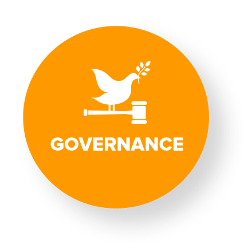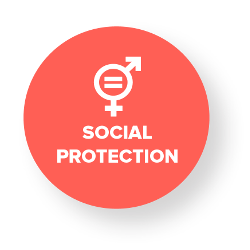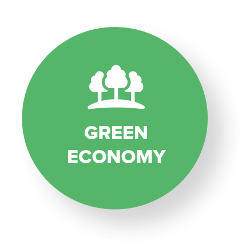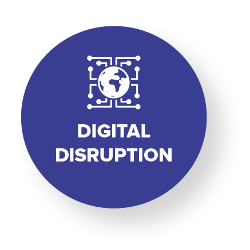Beyond Recovery: Towards 2030
Beyond Recovery: Towards 2030
Our Evolving Response
Prior to Covid 19 pandemic, Bangladesh has made solid strides in poverty reduction over the last few decades, cutting poverty incidence from 50.4% in 1990 to 20.5% in 2019. However, impacts of Covid-19 combined with stringent containment measures have seriously impacted the country’s long-standing macroeconomic stability, disrupted people’s livelihood, and raised poverty to 40.9% in 2020. With about 20 million ‘new poor’ there could about 90 million people, who are under severe poverty stress due to the pandemic. The pandemic has overstressed the country’s fragile heath system, education, human development, basic public services delivery and social upliftment. If the pandemic crisis become protracted, it may turn into an entrenched human crisis, derailing the county’s development transformation including LDC graduation and SDGs.
Mitigating the pandemic is challenging in Bangladesh because of multiple vulnerability transmission channels, including Bangladesh is the second most densely populated country with about 60 million urban slum dwellers. Its narrow fiscal space is further eroded by systemic pilferages. The country is disproportionately dependent on informal sector (87% of total employment). It is crucial that the government, private sector, and development partners in Bangladesh all step up and work together to alleviate the pandemic impacts.
UNDP, together with all development actors, especially the GoB, is fighting to mitigate the pandemic based on ‘whole of the society’ and ‘leaving no one behind (LNOB)’ principles. Its Covid immediate interventions encompass, (1) socio-economic impact and needs assessments for informed policy making and optimal programmatic interventions, including identifying the hotspots and the most vulnerable populace; (2) inclusive and integrated crisis management and response; and (3) health system's and procurement support. Under the leadership of UNRC, UNDP is the technical lead in crafting a robust and integrated multisectoral early recovery plan over next 12/16 months, encompassing all UN agencies.
Simultaneously, UNDP projects such as the Livelihoods Improvement of Urban Poor Communities (LIUPC) project, Strengthening Women’s Ability for Productive New Opportunities (SWAPNO), Access to Information (a2i), and others have been working at the field level providing relief and food to vulnerable communities. A total of 15.05 million people has already been reached by UNDP Bangladesh through different support initiatives e.g. hygiene kits, awareness raising, and facilities. The beneficiary coverage includes more than 59,000 people with disabilities and more than 67,000 in LNOB category (minority ethnic, etc.)
A forward-looking response to COVID-19 is crucial if Bangladesh is to recover quickly from the economic shock and setback of the pandemic. UNDP’s upfront COVID-19 crisis response is designed to help Bangladesh look beyond recovery, towards 2030, making choices and managing complexity and uncertainty in four main areas: governance and agency, social protection, green economy, and digital disruption. UNDP seeks to assist Bangladesh in recalibrating integrated national financing framework together with SDG financing gap and gap financing strategy. On the expenditure side, social expenditure monitoring and mapping of budgets for social development priorities to assist GoB in rebalancing public expenditures. Extend income support measures and in-kind transfers to affected workers, particularly informal and self-employed workers, to sustain household incomes and boost domestic demand; Support socioeconomic and environmental impact assessment of new tax measures and reforms. Undertake business regulatory reforms enabling lower cost of doing business to ramp up private and foreign investment. As an integrator, UNDP will leverage multilateral cooperation.
UNDP's Offer 2.0

This area of work is more important than ever as governments are facing unprecedented pressure to navigate crisis and uncertainty, deliver digitalized services, enable access to information and social protection, and function in transparent, accountable and effective ways. It is crucial to keep the level of coordination and cooperation high between the governments and civil society to advance social cohesion and gender equality while upholding human rights and the rule of law. With the principle of leaving no one behind, we must ensure that the vulnerable group’s justice and security concerns are adequately addressed.
UNDP Bangladesh strives to make institutions of state and society more responsive, inclusive, transparent and accountable to an empowered and responsible citizenry. Our contribution to several government reforms have changed lives and improved the quality of services. By closely working together with a range of national counterparts, we support capacity development, decentralization, building strong democratic institutions and social capital, enabling more innovative and inclusive public services, enhancing development effectiveness, mainstreaming and localizing SDGs, preventing violent extremism, and strengthening access to justice and human rights.

Building on ongoing support to the Government of Bangladesh in implementing its National Social Security Strategy (NSSS), the COVID-19 crisis presents an opportunity to speed up reforms in the country’s fragmented social protection system.
Social protection, including cash transfers, universal health coverage, and access to other basic services, will be critical moving forward. For example, in the absence of a universal income support programme, schemes for specific populations such as stipend programmes for primary and secondary schools, old age allowance, maternity allowance, and disability benefits, can be made universal. Among other priorities and building on lessons learned in light of the pandemic, Bangladesh will have to consider introducing unemployment insurance and develop approaches to cover workers in the informal sector. Currently, approximately 85% of the country’s workforce is informally employed. As part of the reform process, the drive for gender equality is a priority that must be supported to address the discrimination and bias that emanate from entrenched social norms, including around re-distribution of unpaid care work, leadership, and the digital sphere.
For Bangladesh to invest in these areas, fiscal space is required. UNDP echoes the call of the Secretary-General for a debt standstill for all vulnerable countries and will support countries to leverage this fiscal capacity effectively. Building an effective system requires coordinated assistance form development partners to fill in current gaps. Moreover, public-private solidarity and partnerships will be critical to build resilient social protection system that can weather shocks, create strategies for informal sector workers, and design a new generation of resilient, green jobs that support youth-led entrepreneurship.
Social protection, including cash transfers, universal health coverage and access to other basic services, will be central to uprooting the inequalities that permeated societies before COVID-19, and that are starkly visible today. The drive for gender equality is leading a wave of change that must be supported to address the discrimination and bias that emanate from entrenched social norms, including around re-distribution of unpaid care work, leadership, and the digital sphere.
For governments to invest in these areas, they need fiscal space. UNDP echoes the call of the Secretary-General for a debt standstill for all vulnerable countries and will support countries to leverage this fiscal capacity effectively. Public-private solidarity and partnerships will be critical to build resilient social protection systems that can weather shocks, create strategies for informal sector workers, and design a new generation of resilient, green jobs that support youth-led entrepreneurship.

The development pathways over the last few decades largely ignored nature and climate, and if this continues, we will end up with a world with detartrated eco-system harmful for human existence. With data and science, we once again realised that nature could flourish when human interference could be minimised.
This shared realisation is an opportunity to shape Covid-19 response and recovery policies. If we fail to exploit the policy momentum, the risk of business as usual may move back to high carbon-intensive path.
On climate change and energy systems, new IRENA research sets out that the value of decarbonising the global economy by 2050 would be eight times the cost, taking health and education benefits into account. Cumulative global GDP would grow by USD 98 trillion above business-as-usual between now and 2050, and renewable energy jobs would quadruple to 42 million. If recovery is not inclusive and does not protect jobs, it will increase the dependency of people on nature. UNDP believes with the right political and policy decision, we can find a win-win solution, which could create more evident in doing more with less.
UNDP has been working with government, private sector and academia to innovate environmentally sustainable and low carbon solution while we pursue resilient and inclusive recovery. We will continue to co-create such balanced solutions with government and private sector and work with our partners hand in hand to implement them.
This is the moment to restore balance between people and planet, designing and de-risking nature-based solutions as part of a new social safety net for the world, encouraging sustainable public-private partnerships such as in ecotourism and green transport systems, transforming agriculture from a carbon contributor to a carbon sink, and ensuring integrated thinking and action with the health sector to tackle air pollution that kills seven million people each year.
On climate change and energy systems, new IRENA research sets out that the value of decarbonizing the global economy by 2050 would be eight times the cost, taking health and education benefits into account. Cumulative global GDP would grow by USD 98 trillion above business-as-usual between now and 2050 and renewable energy jobs would quadruple to 42 million.
Today, therefore, as governments determine how to invest tax-payers’ money, they have a choice to make: stimulate fossil fuel industries and other remnants of the way things were—short-term band-aids that will reinforce the collision course with nature—or invest in an inclusive green economy.

UNDP along with UN and other partners is supporting the government to ensure an effective crisis response through the digital platforms significantly in the tele-schooling, tele-medicine, tele-working and Digital payment sectors. Many sectors of the economy are increasingly having to operate ‘remotely’ powered by digital technologies and this phenomenon will no doubt expand rapidly and become the ‘new normal’ and define the future of work. More and more people will continue to work from home where tele-working will play a vital role. a2i’s electronic filing management system (eNothi) has ensured that many decision-makings in public authorities do not suffer during the lockdown.
UNDP with its other partners have been analyzing the effects of the COVID crisis on education sector and young generation of Bangladesh, and have been responding on reaching them through digital medias ensuring high human development. UNDP supported a2i programme has started large scale distance learning initiatives based on TV and digital platforms. This includes Digital classes through National TV channel and online classes through verified Facebook groups lead by local teachers serving millions of students. Virtual classes have also been launched meanwhile through virtualclass.gov.bd to continue online classes for universities and capacity development of teachers.
a2i in partnership with relevant national and international agencies, is helping the government to provide necessary data in order to identify the geographical location of COVID positive patients. Data from the technology-enabled epidemiological health surveillance from various sources are analyzed to empower the health system to identify or predict the hot zones. This approach is helping the government to avoid the need for full national lockdown. The nationwide Hotline 333 has been repurposed for providing interactive voice response health services to callers which is also helping identify the most vulnerable areas and conduct food and relief distribution activities. More than 30K doctors and health workers are being trained to fight the coronavirus using the government’s open e-learning platform MuktoPaath. All these are done harnessing technology in a manner that is customized to the Bangladeshis while ensuring the safety of healthcare providers and maximizing their productivity enabling data-driven policy making and response.
Digital payments during the COVID-19 crisis has also taken a new form. ‘Ek Desh’ the first Crowdfunding FinTech Platform in Bangladesh to disburse Zakat and Relief Payments Digitally. Workers in the RMG sector with mobile wallets are having their salaries debited directly into their accounts using mobile digital technology. a2i- UNDP launched an online marketplace ‘Anondomela’ which directly links buyers and absolutely micro-small entrepreneurs on an e-commerce platform. “Phone-e-Nittoponno,” a digital platform has been introduced where daily necessities through Ekshop platform is addressed and delivered through a National Volunteer Network.
UNDP’s Human Rights and Justice programme and a2i jointly introduced digital means accompanied by business process simplifications to continue functioning of courts, UNDP have managed to secure impressive results in less than three weeks. With the Judiciary and the Government jointly driving the process, a Presidential Ordinance on Virtual Courts has enabled 139 lower courts and three high court benches exercising their jurisdiction to continue judicial services.
Resources
UNDP has so far allocated $452K for socio-economic recovery and health system support. It has also submitted $1.2 million proposal to EU/ECHO for additional PPE support to the country.
The main focus of UNDP support is to help vulnerable populations cope with the impact of COVID-19. It also aims to develop health system capacities for treatment and preventing the spread of COVID-19. As part of the crisis response and management, it is also leveraging non-governmental organizations to advocate for the adoption of life-saving precautionary measures at community and household levels, in collaboration with other UN partners.
Programme Area |
Required |
Available |
Gap |
Governance |
7,500,000 |
$286,000 |
$7,214,000 |
Social Protection |
$800,000 |
$0 |
$800,000 |
Green Economy |
$3,200,000 |
$ 166,000 |
$3,034,000 |
Digital Disruption |
7,500,000 |
$286,000 |
$7,214,000 |
Total |
11,500,000 |
$ 452,000 |
$11,048,000 |

 Locations
Locations